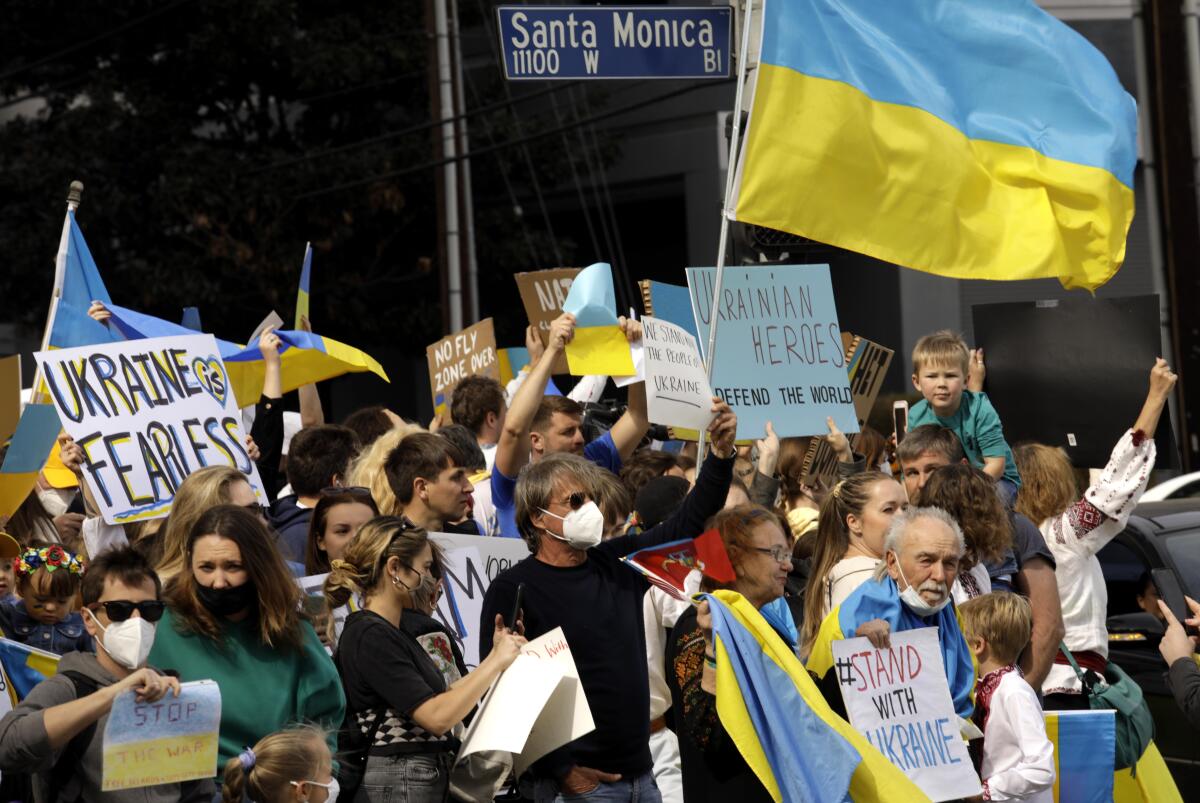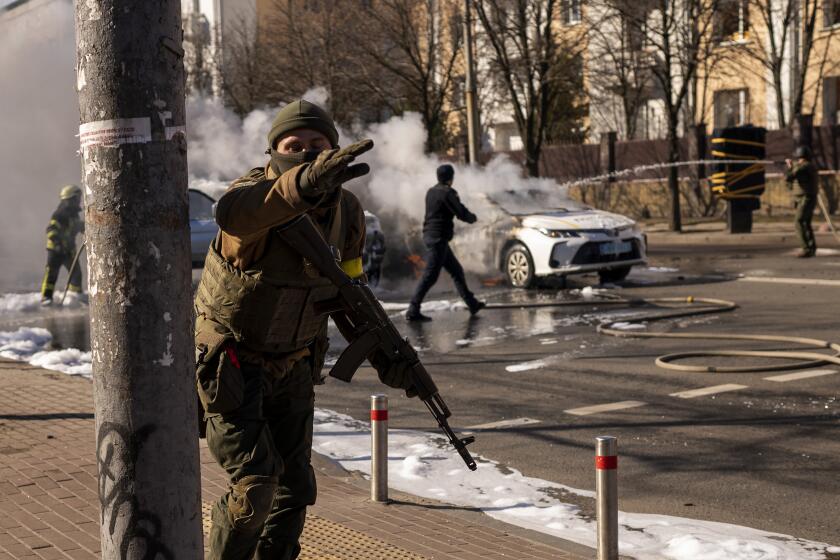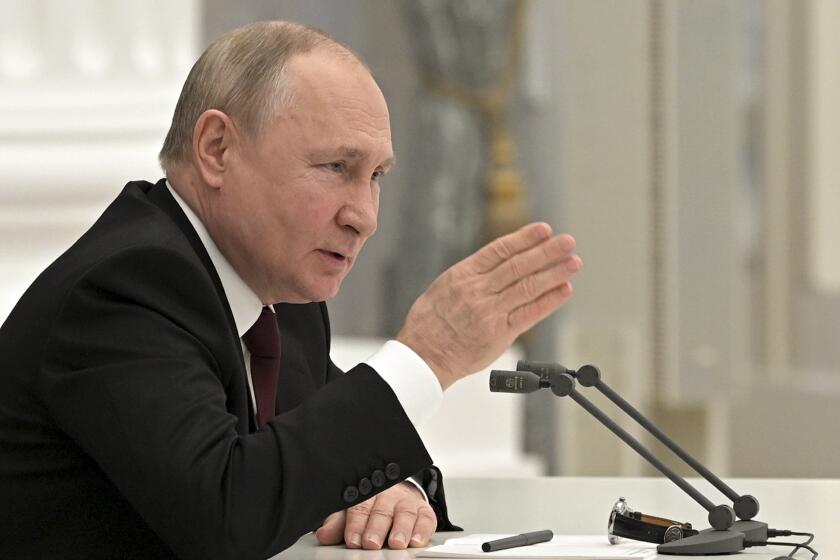Recalling a ’90s Ukraine on the verge of hard-won independence

- Share via
SACRAMENTO — Thirty-two years ago, I saw something in Odessa, Ukraine, that still fascinates me.
We were at a popular park on the Black Sea. A long line of Ukrainians — maybe 50 — were at a booth where T-shirts, snacks and newspapers were being sold. People were there for the newspapers.
Even back then, this was a remarkable sight. Americans weren’t lining up for newspapers three decades ago and certainly aren’t these days.
Ukrainians were grabbing up newspapers because their parliament had just — on July 16, 1990 — declared the nation’s independence from the Soviet Union.
They couldn’t read enough about it. This was their July 4, 1776.
But there were no fireworks. No high-fives. Not even much talk. It was eerily quiet. People sat at picnic tables, on benches or on the grass immersed in a paper. Their faces showed confusion and concern.
You could see them thinking: “Now what?” “How does this affect me?” “What will the Russians do?”
Russian troops bear down on Kyiv and continue their thrust into Ukraine’s second-largest city, Kharkiv. Putin puts nuclear forces on alert.
It took a while, but they began to get an answer 24 years later when Russia “annexed” — seized — Ukraine’s Crimean Peninsula.
The full answer came last Thursday when Russian President Vladimir Putin ordered a brutish attack on Ukraine by land, sea and air.
In Odessa, people awoke to exploding missiles. Russian troops and tanks moved north from the Crimea. In the Black Sea, where our cruise ship had sailed placidly in 1990, foreign commercial vessels reported being hit by bombs and missiles.
It reminds us of the difference a national leader can make. In 1990, Russia was led by a friendly reformer, Mikhail Gorbachev. Now, it’s being dangerously steered off course by a Soviet throwback bully.
The collapse of the Soviet Union and emergence of democracies in Eastern Europe was an exciting time in the 1990s and early 2000s — especially for American political consultants and activists who were drawn to the struggle for democratization.
One such political junkie was Sean Garrett, a 24-year-old press aide for Gov. Pete Wilson.
Garrett’s birth mother was a Lithuanian immigrant and he’d always been curious about his roots. So in 1992 he wrangled a job helping the pro-democracy side in Lithuania’s second free election.
“Everyone in the governor’s office thought I was insane,” Garrett, now 54, recalled last week.
Garrett became an instant celebrity in Lithuania.
“Not only was I from America, I was from California,” he told me later. “For them, California meant the ultimate dream — Hollywood, beaches ….
Russian President Putin seems willing to sacrifice so much to occupy Ukraine. It is part of his attempt to rebuild a Russian empire loyal, essentially, to him.
“The easiest way to get a laugh was to tell them that California now had problems, and that Californians didn’t like California so much anymore. They’d just start laughing. They couldn’t grasp it. They were cold, hungry, out of work, out of gasoline.”
Garrett constantly urged democracy advocates to keep their message simple. One day he provided an example. At a rock concert, he suddenly was asked to address the 5,000 young people there.
“I walked out,” he recalled, “and said, ‘I’ve got one question for the future of Lithuania: Do you want Lenin, or do you want Levi’s?
“They went nuts. ‘Levi’s. Levi’s.’”
Four years later, Garrett worked in Ukraine helping people adjust to a free market economy.
But for most of his career, he has been a public relations consultant for Bay Area tech firms.
“A lot of people who have only been to Western Europe still think of Eastern Europe as a Soviet bloc,” Garrett says. “If you’ve been to Paris or Munich, you’ve been to Ukraine. It’s very European.”
In 1996, three top Wilson strategists were hired covertly to help Russian President Boris N. Yeltsin win reelection. His image was in the dumpster. But being Americans, they couldn’t be seen working with the Kremlin leader. So, they secretly dealt with his influential 36-year-old daughter.
Yeltsin beat a hard-core communist.
“You’re dealing with the oligarchs in Russia,” lead strategist George Gorton later recalled. “It can be frightening. … I was very happy to get out in one piece.”
Before he ran Arnold Schwarzenegger’s successful 2003 recall campaign that toppled Gov. Gray Davis, consultant Mike Murphy worked for capitalist causes in Romania and Georgia.
In Romania, he scrounged up money for a newspaper backing the opposition so it could bribe a nightwatchman to obtain a railroad car full of newsprint. The government was blocking the paper’s access to it.
In Georgia, he advised pro-democracy candidates running against a Russian-backed party.
“Western consultants rely on mass communication, persuasion and organizing,” he says. “Russians just tell the head of the railroad to call in everyone for emergency work on election day so they can’t vote. We put up a negative TV ad in Georgia, and they just turned off the power. Pretty slick.”
As for Putin, “at the end of this he’ll be a pariah,” Murphy says. “Putin may win a few military battles, but he’s going into a quagmire. He’s delusional.”
For one, Russia’s economy is only half the size of California’s.
State budget nerds in Sacramento are trying to assess what financial effect the war and sanctions will have on California.
“It won’t amount to a hill of beans for the fifth-largest economy in the world,” says finance department spokesman H.D. Palmer.
“Both Ukraine and Russia are relatively small trading partners. Russia constitutes 0.3% of California’s total exports and 0.5% of imports.”
It’s a given gas prices will rise.
Murphy’s right: Putin will score short-term military wins, but in the long run he’ll be branded a loser — a power-mad thug who brutalized a neighbor and threw his own country under the avtobus.
Odessans will love reading about it in their newspaper.
More to Read
Sign up for Essential California
The most important California stories and recommendations in your inbox every morning.
You may occasionally receive promotional content from the Los Angeles Times.
















